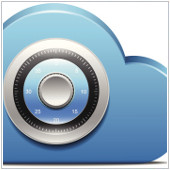August 31, 2015
 If you’re considering transitioning your business to the cloud, have you considered the security of the platform? While providers would like us to believe that the friendly fluffy cloud image used to market the service means it is automatically secure, the truth is that the reality is far different. Just ask one of the nearly seven million Dropbox users who had their accounts hacked. This is not meant to scare you, but only to make you aware that cloud security needs to be taken seriously - especially if you’re a business owner. To help you take the correct precautionary measures as you transition to the cloud, we’ve put together a list of actions you can take to ensure cloud security.
If you’re considering transitioning your business to the cloud, have you considered the security of the platform? While providers would like us to believe that the friendly fluffy cloud image used to market the service means it is automatically secure, the truth is that the reality is far different. Just ask one of the nearly seven million Dropbox users who had their accounts hacked. This is not meant to scare you, but only to make you aware that cloud security needs to be taken seriously - especially if you’re a business owner. To help you take the correct precautionary measures as you transition to the cloud, we’ve put together a list of actions you can take to ensure cloud security.
The cloud is playing more and more of a significant role in business. Yet, as more companies jump on the bandwagon, very few of them seem to be taking cloud security seriously. According to a recent survey, the "Security of Cloud Computing Users Study" , only 50 percent of those surveyed had investigated the security of the cloud services they used.
To ensure you put in place proper security measures when beginning your cloud venture, here are five actions every small business owner should take.
Ask your IT provider what cloud security policies they have in place - this is probably the single most important security measure you can take. Find a trusted IT provider and have a candid conversation with them about their cloud security policies.
Ask where the location of the physical cloud servers are - when you have “the conversation”, don’t forget to ask about this. Believe it or not, some cloud servers may not even be stored in your own country. Wherever they are, it’s wise to make sure they’re located in a safe data center area with proper security afforded to them.
Create unique usernames and passwords - your login credentials represent one of the cloud’s main security vulnerabilities. Take the time to come up with a better password than “12345” or “football.”
Use industry standard encryption and authentication protocols - IPsec (Internet Protocol Security) is a reliable technology choice.
Encrypt data before it’s uploaded to the cloud - whether you do it yourself or your cloud computing provider does it for you, this is a must to ensure security.
When it comes to trusting the security of a cloud service provider, transparency is key. The provider should take security seriously, be able to explain their security policies clearly, and be willing to answer any questions. If they can’t do one of these, it’s a clear sign of a red flag.
Are you ready to talk cloud security and transition your business into the cloud? Call us today. We’re happy to answer all your questions.
Published with permission from TechAdvisory.org. Source.
Technology Solutions Advisor | Omega
Business Systems | www.omegabiz.com
Office (817) 492-4249 x125| Fax (817)
492-4250

 Businesses everywhere are embracing Voice over Internet Protocol (VoIP) technology to communicate more effectively with colleagues, clients, and suppliers. Do you have a VoIP phone system in place? When it comes to transitioning your business from traditional phone lines over to VoIP, preparation is vital to seamless and successful implementation. Here are the key components you need to examine in order to properly prepare your business for VoIP.
Businesses everywhere are embracing Voice over Internet Protocol (VoIP) technology to communicate more effectively with colleagues, clients, and suppliers. Do you have a VoIP phone system in place? When it comes to transitioning your business from traditional phone lines over to VoIP, preparation is vital to seamless and successful implementation. Here are the key components you need to examine in order to properly prepare your business for VoIP. The scale of the recent security breaches at Sony, which led to the cancellation of The Interview’s theatrical release, can make the company’s problems seem beyond the realm of the average small business. But the security mishaps that created the circumstances for the hack are as applicable to modest local and regional companies as they are to multi-million dollar corporations. These three tips will take you back to security basics and help avert your own big-screen drama.
The scale of the recent security breaches at Sony, which led to the cancellation of The Interview’s theatrical release, can make the company’s problems seem beyond the realm of the average small business. But the security mishaps that created the circumstances for the hack are as applicable to modest local and regional companies as they are to multi-million dollar corporations. These three tips will take you back to security basics and help avert your own big-screen drama.